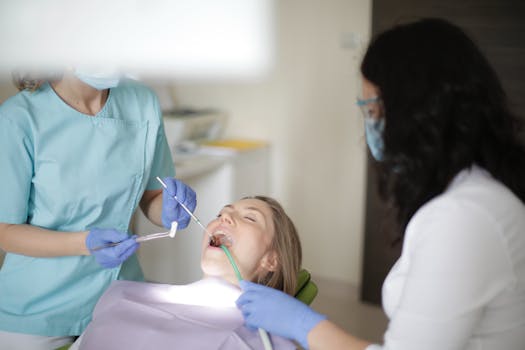The best foods for healthy teeth
We all know how important it is to look after our teeth, but what happens after brushing, professional teeth cleaning or other dental care treatments? How does our eating behaviour with different foods and beverages affect the health and appearance of our teeth? In this article, you will find out everything you need to know to keep your teeth healthy and shiny.



The importance of dental hygiene
Before we turn our attention to food, it is important to understand the basics of dental hygiene. Regular and thorough dental care is crucial to prevent tooth decay, periodontitis and other gum diseases. Brushing your teeth, using dental floss and interdental brushes and regular visits to the ALPINE WHITE Studio are essential to remove plaque and stubborn plaque.
Professional teeth cleaning
During a professional dental cleaning, the teeth are not only cleaned but also polished to remove surface discolouration. This polish helps to restore the natural whiteness of the teeth and strengthen the pellicle, a protective layer on the teeth. Come by our ALPINE WHITE Studio and have your teeth professionally cleaned.
Gum care
Gum health is a key aspect of oral hygiene. Inflamed or receding gums can be an early sign of periodontal disease, a serious condition that can lead to tooth loss. Gentle but effective cleaning of the gums, especially along the gum line and in the spaces between the teeth, is therefore essential.
Tartar removal
Tartar, a hardened form of dental plaque, can only be removed with professional hand instruments in the dental practice or at our ALPINE WHITE Studio. Regular removal of tartar is important to prevent periodontitis and gum disease.
Oral hygiene routine
Good oral hygiene involves more than just brushing your teeth. Regular cleaning of the spaces between the teeth with dental floss or interdental brushes is crucial to remove plaque and food debris that can accumulate in these hard-to-reach areas.
Avoidance of colouring stimulants
Colouring drinks such as coffee, tea and red wine are popular, but can also lead to discolouration of the teeth. To minimise the build-up of dyes, it is best to rinse your mouth with water or use a mouthwash after consuming these drinks. This simple habit helps to keep teeth clean and reduce discolouration.
For those who want additional whitening, ALPINE WHITE offers an effective and safe solution. Our whitening process is free of peroxides and instead utilises PAP (phthalimidoperoxyhexanoic acid) as an alternative. This method is gentle on the enamel and ideal for anyone who wants gentle but effective whitening of their teeth without the risks and side effects of peroxides. With ALPINE WHITE you can whiten your smile and protect your dental health at the same time.
Combat bad breath
Bad breath is often a sign of poor oral hygiene. Brushing your teeth regularly, cleaning the spaces between your teeth and using mouthwashes can help to prevent bad breath and keep your breath fresh.
Dentures and special care
People with dentures such as crowns, bridges or implants require a customised oral hygiene strategy. Careful cleaning of the dentures and surrounding teeth is crucial to prevent inflammation and the build-up of stubborn plaque.
Eating after professional teeth cleaning
It is particularly important to pay attention to your diet after a tooth cleaning. It is recommended that you do not eat for at least 1 hour. The teeth are freshly cleaned and the tooth surfaces and interdental spaces are particularly sensitive.
What you should avoid:
- Acidic foods: You should avoid acidic foods and drinks such as cola, citrus fruits or vinegar immediately after a dental cleaning. These can attack the freshly polished tooth enamel.
- Colouring foods: Foods such as beetroot, blueberries or black tea can quickly discolour freshly cleaned teeth. It is best to wait 24 hours before eating such foods.
- Very hard foods: Avoid very hard foods immediately after a dental cleaning so as not to damage the sensitive tooth necks and the enamel surface.
What you should eat:
After a professional dental cleaning, it's important to choose the right foods to protect your freshly cleaned teeth and support the healing process. Here are some foods you should consider:
Soft, neutral foods
- Bananas: This fruit is not only soft and easy to eat, but also rich in important nutrients that contribute to overall health.
- Soft-boiled vegetables: Vegetables such as carrots, broccoli or spinach, when soft-boiled, provide important nutrients without stressing the teeth. They are also a good source of vitamins and minerals that contribute to dental health.
- Soups and broths: Warm, but not hot, soups and broths are soothing and nutrient-rich, ideal for right after a dental cleaning.
- Smoothies: A nutrient-rich smoothie made from fruits and vegetables is an excellent choice. Be careful to avoid straws as sucking can put pressure on the teeth.
- Eggs: Soft-boiled or poached eggs are an excellent source of protein and easy to eat without straining your teeth.
- Tofu: For vegetarians and vegans, tofu is a good source of protein that is also soft enough to eat after a PZR.
- Oatmeal: A warm, soft oatmeal is soothing while providing important nutrients.
Dairy products
- Cheese: Cheese is rich in calcium and phosphates, which help to remineralise tooth enamel and balance the pH in the mouth.
- Milk: Another great source of calcium and phosphates. It helps to neutralise acidity in the mouth and promotes healthy teeth.
- Yoghurt: Yoghurt is soft, easy to eat and rich in calcium, which is good for your teeth. It's best to choose plain yoghurt with no added sugar to avoid extra bacterial contamination.
Foods that whiten the teeth
While some foods are known to cause discolouration on teeth, there are also foods that can naturally help whiten teeth. These foods are not only healthy, but also help to make your smile brighter.
Apples
Apples are not only healthy, they also act as a natural toothbrush. Chewing an apple stimulates saliva production, which helps to remove plaque bacteria and food debris from the teeth. The mild acidity of apples also helps to whiten teeth naturally.
Carrots
Carrots are rich in vitamin A, which is essential for dental health. Similar to apples, chewing raw carrots encourages saliva production, which acts as a natural cleanser for the teeth. They help to remove discolouration and contribute to a bright smile.
Celery
Celery also acts like a natural toothbrush. Its fibrous structure helps to clean the teeth and remove plaque. Chewing celery promotes saliva production and helps to keep teeth clean and bright.
Strawberries
Strawberries contain malonic acid, a natural whitening component. They can help to remove superficial discolouration and whiten teeth. However, it is important to brush your teeth after eating strawberries, as the fruit acids can attack the tooth enamel.
Cheese and dairy products
Cheese, yoghurt and milk are rich in calcium and phosphate, which can strengthen and remineralise tooth enamel. These dairy products also help to neutralise the pH value in the mouth, which reduces the formation of acid and thus the erosion of tooth enamel. Cheese can also help to remove discolouration as it stimulates saliva production.
Further tips for healthy teeth
Avoid sugary and acidic foods
Sugar and acids are the main enemies of healthy teeth. They promote the development of tooth decay and can attack tooth enamel. Try to reduce your consumption of sweets, soft drinks and acidic fruit.
Drink water
Water is the best drink for dental health. Water rinses the mouth and removes loose particles. It also supports saliva production, which is essential for the natural cleaning of teeth and protection against tooth decay.
The role of fluoride
Fluoride plays an important role in dental care. It strengthens tooth enamel and helps prevent tooth decay. Make sure to use a toothpaste with fluoride, especially after eating acidic foods, to protect the enamel. Use the Whitening Toothpastes from ALPINE WHITE, which also contain fluoride.
Meals and snacks between meals
It is not only important what you eat, but also when you eat. Frequent snacking between meals can increase the risk of tooth decay as the saliva does not have enough time to neutralise the acids in the mouth. Try to plan your meals and avoid constant snacking.
Closing words
The right diet plays a crucial role in the health of your teeth. After a professional dental cleaning, you should be particularly careful and avoid certain foods. In everyday life, a healthy diet helps to keep your teeth strong and healthy. Remember to look after your teeth regularly and visit the dental practice for regular check-ups and cleanings.
At ALPINE WHITE, we are continually committed to providing you with the best tips and products for your dental health. Visit our website for more information and stay up to date with the latest trends and findings in the field of dental hygiene.
Stay healthy and shine with your healthy, white teeth!


